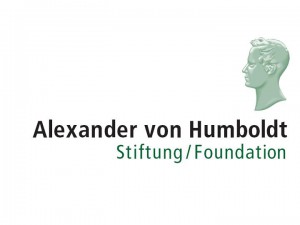The Alexander von Humboldt Foundation
 The Alexander von Humboldt Foundation promotes academic cooperation between excellent scientists and scholars from abroad and from Germany. To this end, it grants more than 700 research fellowships and research awards annually. These allow scientists and scholars from all over the world to come to Germany to work on a research question they have chosen themselves together with a host and collaborative partner. Scientists or scholars from Germany can also profit from the support and carry out a research project abroad as a guest of one of well over 27,000 Humboldt Foundation alumni worldwide – the Humboldtians. The Foundation’s network embraces scientists and scholars from all disciplines in more than 140 countries worldwide – including 52 Nobel Prize winners.
The Alexander von Humboldt Foundation promotes academic cooperation between excellent scientists and scholars from abroad and from Germany. To this end, it grants more than 700 research fellowships and research awards annually. These allow scientists and scholars from all over the world to come to Germany to work on a research question they have chosen themselves together with a host and collaborative partner. Scientists or scholars from Germany can also profit from the support and carry out a research project abroad as a guest of one of well over 27,000 Humboldt Foundation alumni worldwide – the Humboldtians. The Foundation’s network embraces scientists and scholars from all disciplines in more than 140 countries worldwide – including 52 Nobel Prize winners.
If you would like to become a member of the Humboldt Family, only one thing counts: your own excellent performance. There are no quotas, neither for individual countries, nor for particular academic disciplines. The selection committees comprise academics from all fields of specialisation and they make independent decisions, based solely on the applicant’s academic record. The Humboldt Foundation supports people, not projects. After all, even in times of increasing teamwork, it is the individual’s ability and dedication that are decisive for academic success.
Once a Humboldtian, always a Humboldtian. Even after the stay in Germany has come to an end, the Humboldt Foundation maintains close links with their alumni. The alumni sponsorship is tailored to the needs of every single Humboldtian, providing flexible support for the particular development and path in life as well as for cooperation with others.
Roots
Alexander von Humboldt (1769–1859) was a discoverer and cosmopolitan, a fighter for the freedom of research, a humanist and a patron of excellent academic talent. Shortly after his death, the Alexander von Humboldt Foundation for Nature Research and Travel was established in 1860. Until it lost its endowment capital in the inflation of 1923, it essentially provided support for German scientists setting off on research journeys to other countries. The objective was to use international exchange in the spirit of Humboldt to overcome boundaries and promote universal understanding. A new Alexander von Humboldt Foundation was established by the German Reich in 1925. Its main purpose was now to support foreign students and later academics and doctoral candidates during their stay in Germany. In 1945, the Foundation ceased functioning. Today’s Alexander von Humboldt Foundation was established by the Federal Republic of Germany on 10 December 1953.
Mutual understanding coupled with academic freedom and excellence have remained the Humboldt Foundation’s creed to this day. With Humboldt as a model, it maintains an international network of academic cooperation.
The Alexander von Humboldt Foundation is funded by the Federal Foreign Office, the Federal Ministry of Education and Research, the Federal Ministry for Economic Cooperation and Development, the Federal Ministry for the Environment, Nature Conservation, Building and Nuclear Safety as well as a number of national and international partners.
For more information please visit the Humboldt Foundation’s website or contact the Foundation’s main office.